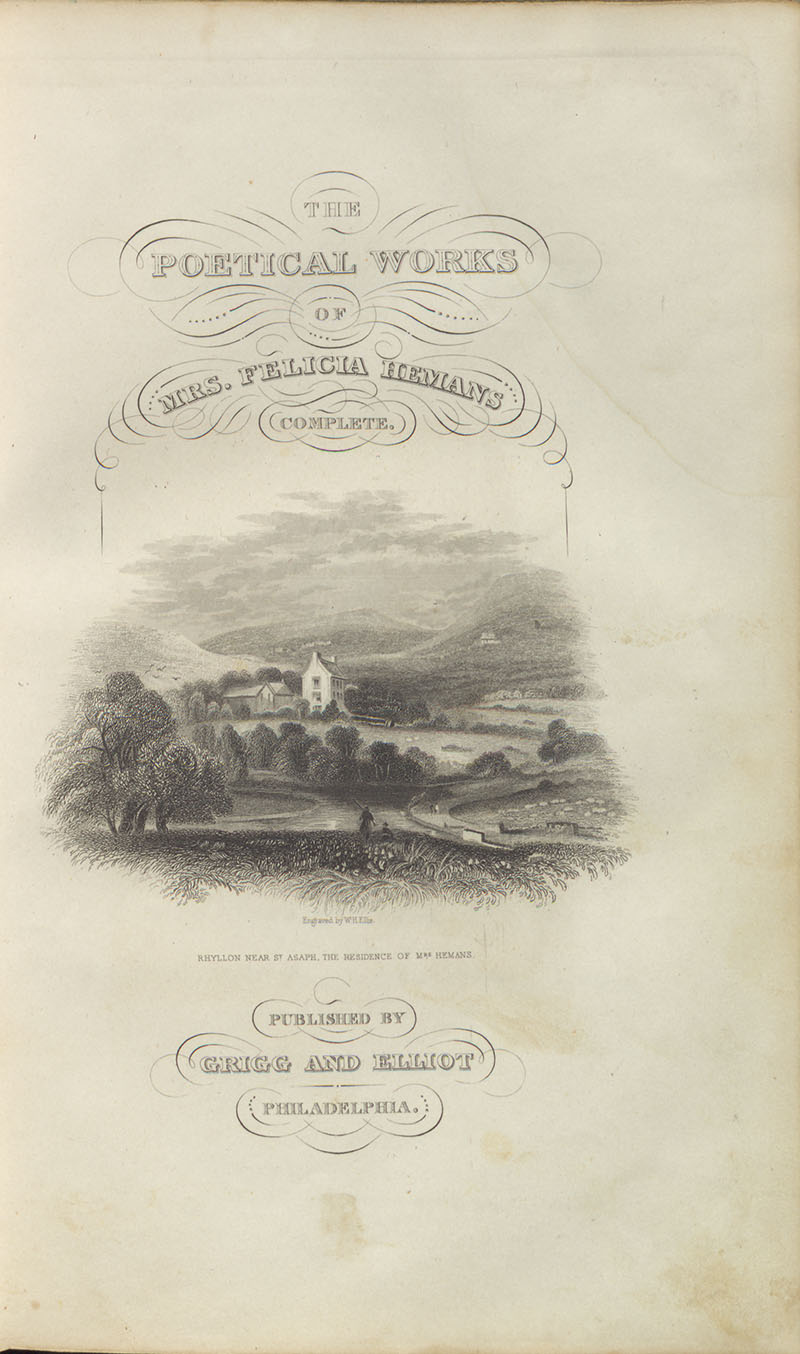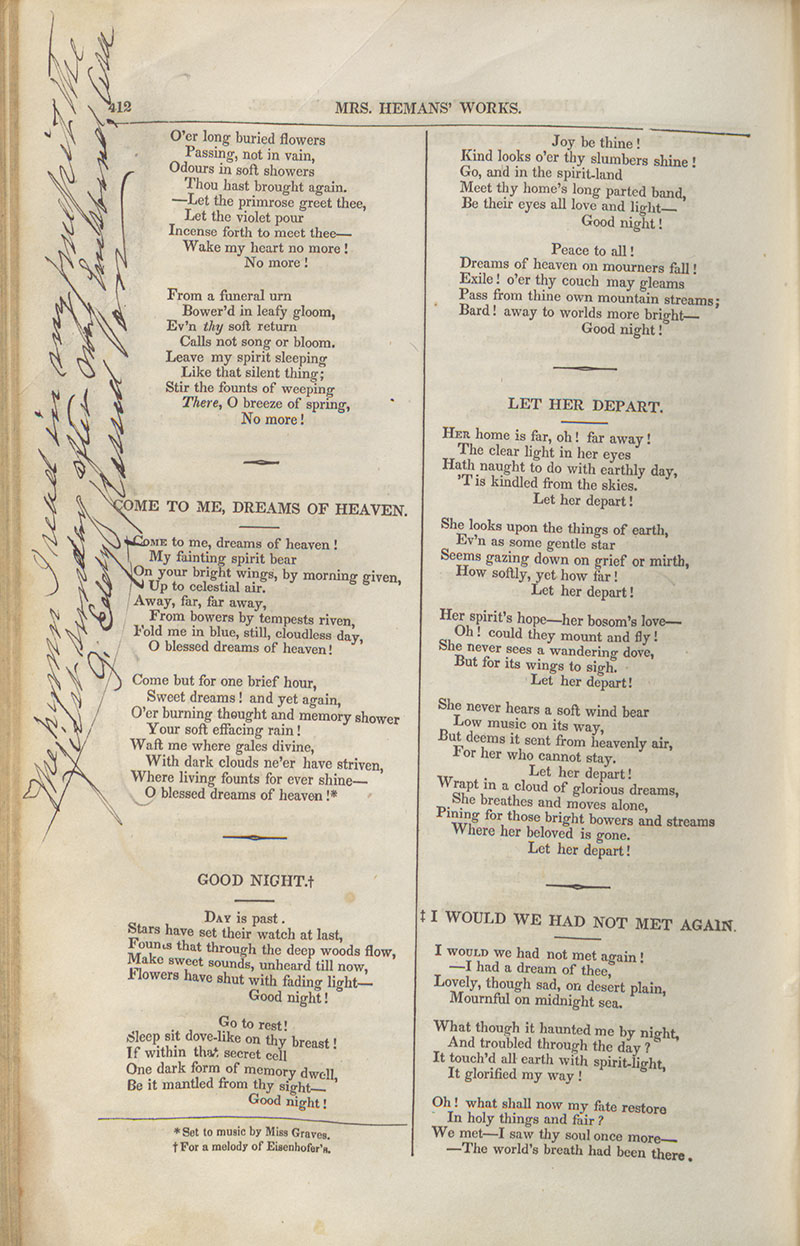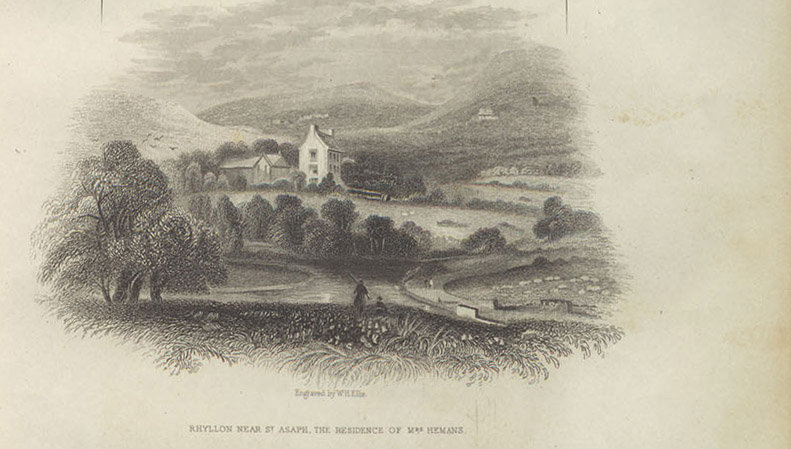Title page image, The Poetical Works of Mrs. Felicia Hemans, circa 1847. B00203.
In 1901 Joseph I. C. Clarke interviewed Mary Baker Eddy in her home, for a New York Herald article titled “Mrs. Eddy Outlines Basis of her Religion.” They discussed the foundation and growth of Christian Science.
Clarke then veered to more personal questions, asking Eddy, “And what works do you prefer?” She responded, “I will tell you the books and writers that I have loved best. They are: Young’s Night Thoughts, Alexander Pope’s poems, Felicia Hemans’ poems, Ruskins’ works, Robert Browning’s poetry, Elizabeth Barrett Browning’s poetry, Ralph Waldo Emerson’s poetry and essays, and Amos Bronson Alcott’s works.”1
Of the books Eddy mentioned in that interview, several were present in her library at the time of her passing. These included Night Thoughts on Life, Death, & Immortality by Edward Young, Poetry and Essays and Nature by Ralph Waldo Emerson, and The Poetical Works of Mrs. Hemans.2 Some of the books include annotations in Eddy’s hand. But she neither marked nor referenced any of the above-mentioned books more than the last.

Title page, The Poetical Works of Mrs. Felicia Hemans, circa 1847. B00203.
Hemans (1793–1835) was an English poet of great popularity in the nineteenth century, because of her idealist Victorian themes and range of subjects.3 Her fame has dwindled, but during Eddy’s lifetime her works were well known and influenced many poets and writers.
Biographer Robert Peel has suggested that Hemans’s impression on Eddy began as early as age 12 and is evident in her poem “Resolutions for the Morning.”4 She carried this influence throughout her life and directly quoted Hemans in many of her works, including Science and Health with Key to the Scriptures, where she mentioned “a weary searcher for a viewless home” in quoting Hemans’s “The Dreaming Child.”5
Eddy referred to another Hemans poem, “Forest Sanctuary,” in Retrospection and Introspection, likening her experience of hearing God’s voice to that of the character in the poem—a Spaniard who fled religious persecution and sought refuge in a forest, where he found comfort in his religious beliefs:
Is it not much that I may worship Him,
With naught my spirit’s breathings to control,
And feel His presence in the vast dim
And whispering woods, where dying thunders roll
From the far cataracts? Shall I not rejoice
That I have learned at last to know His voice
From man’s – I will rejoice! My soaring soul
Now hath redeemed her birthright of the day,
And won, through clouds, to Him, her own unfettered way!6
Generally Eddy used only brackets and lines to mark passages in her copy of The Poetical Works of Mrs. Hemans, but occasionally she would write short notes. For example, next to “Come to me Dreams of Heaven,” Eddy added, “The Hymn I read in my pulpit the first Sunday after my husband, Asa Eddy passed on.”7

Inscription in Eddy’s handwriting, The Poetical Works of Mrs. Felicia Hemans,
page 412. B00203. © The Mary Baker Eddy Collection.
We don’t know whether or not Eddy wrote this inscription when looking back on that sad day in 1882. But it seems certain that Felicia Hemans’s poems were among those that the discoverer of Christian Science loved best—familiar words she returned to again and again, for healing and inspiration.
- J.I.C. Clarke, “Mrs. Eddy Outlines Basis of her Religion,” New York Herald, May 5, 1901.
- B00339, B00175, B00176, and B00203.
- Mrs. Hemans’s full name was Felicia Dorothea Browne Hemans, but she is most commonly referred to as Mrs. Hemans. See Susan J. Wolfson, ed., Felicia Hemans: Selected Poems, Letters, Reception Materials (Princeton, New Jersey: Princeton University Press, 2000), xiii.
- Robert Peel, Mary Baker Eddy: The Years of Discovery (Boston: Holt, Rinehart and Winston, 1966), 26.
- Mary Baker Eddy, Science and Health with Key to the Scriptures (Boston: The First Church of Christ, Scientist), 121:16.
- Mary Baker Eddy, Retrospection and Introspection (Boston: The First Church of Christ, Scientist), 9.
- B00203.


